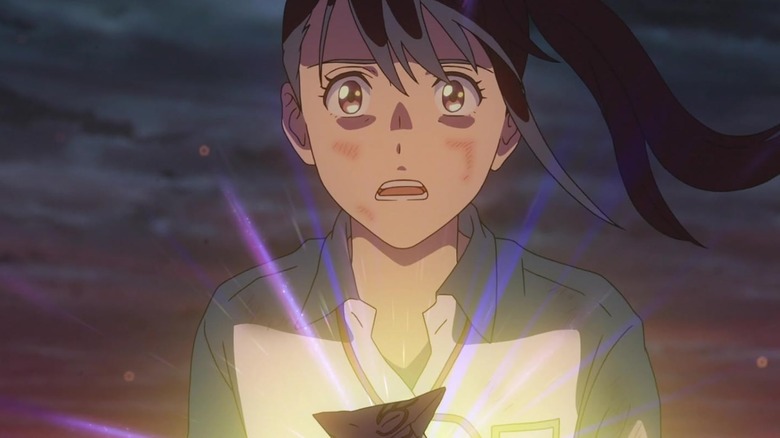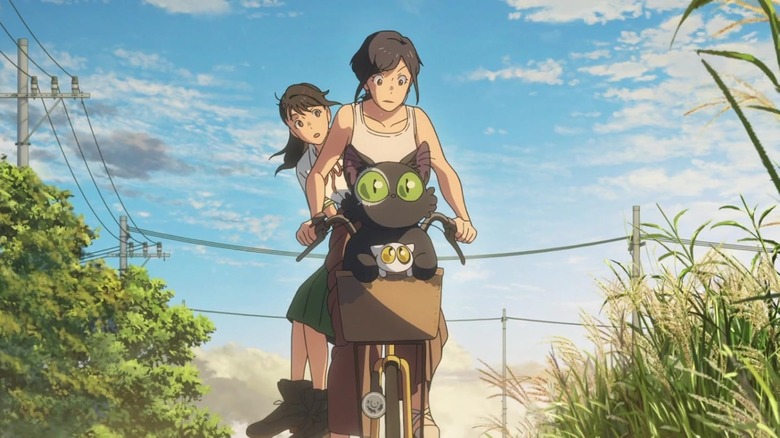Suzume Director Explains How To Stand Out From Disney And Pixar [Exclusive]
It's reductive to proclaim Makoto Shinkai "the new Hayao Miyazaki," but the comparison isn't entirely unwarranted. Like the Studio Ghibli maestro, the Japanese filmmaker has come to garner critical acclaim and box office success on a global scale thanks to films like "Your Name" and his latest movie, "Suzume." In a departure from Shinkai's previous work, "Suzume" even incorporates some Ghibli-esque flourishes, including a mystical talking cat and a handsome male lead who's transformed into a small three-legged stool for much of the runtime (not to mention the film's deliberate Ghibli Easter eggs). Generally speaking, however, the only thing that Shinkai and Miyazaki's animated films really have in common is how distinctly Japanese they are.
Take "Suzume," a film that's all about Japan's seismic activity (the country is subject to roughly 1,500 earthquakes of varying magnitudes every year) and the mythology that has sprung up around it. It also deliberately invokes the destructive earthquake and tsunami that struck the Tōhoku region of Japan in March 2011, a traumatic historical national event commonly referred to as 3.11. "Suzume" isn't the first time Shinkai has referenced the event; but where "Your Name" alluded to it through the metaphor of the devastation inflicted by a passing comet, his newest film makes this allusion far more explicit. It recalls the longtime influence of WWII on the themes and imagery of Miyazaiki's own work (with his last two directorial efforts, "The Wind Rises" and "The Boy and the Heron," even weaving the war directly into their plots).
There's a lot more to it than that, but you get the idea. Speaking to /Film's William Bibbiani, Shinkai talked about this culturally specific approach to animated storytelling and how it can help filmmakers to better step outside the shadow of animation titans like Disney and Pixar.
'I think it's important to cherish what cannot be localized'
Recent years have seen a growing number of films challenge what American animation can encompass, from the "Spider-Verse" movies to the work of "Teenage Mutant Ninja Turtles: Mutant Mayhem" director Jeff Rowe. It's something Shinaki has become keenly aware of as he seeks to help Japanese animators (himself included) "expand our worldwide audience and footprint," as he told Bibbiani. That said, he feels it's important that animators also retain the cultural nuances of their work.
"I think very much what I do is rooted in Japanese culture, and I think it's important to cherish what cannot be localized because it feels like there's something there," he explained, citing this as the key to standing out in the worldwide animation industry:
"Because you look at companies like Disney or Pixar and they're already doing the super multicultural, something that it's for everyone, all audiences, all ages [type of filmmaking], and very intentionally done so. In order to almost differentiate or value add in a different way, I think it's important for us to bring in these subtle nuances that almost cannot be localized, but people still find engaging. So I think regardless of what I do in the future, I will continue to have that in my mind as I create new films."
Speaking to Shinkai's point, it's possible to enjoy a film like "Suzume" without fully grasping its references to Japanese history. At the same time, it's elements like these (combined with their unique aesthetic sensibilities) that allow the likes of Shinkai and Miyazaki to continue standing out, even as their American competitors aspire to carve out a larger slice of the global box office pie for themselves. Up-and-coming animators would do well to heed Shinkai's words.
"Suzume" is now streaming on Crunchyroll.

